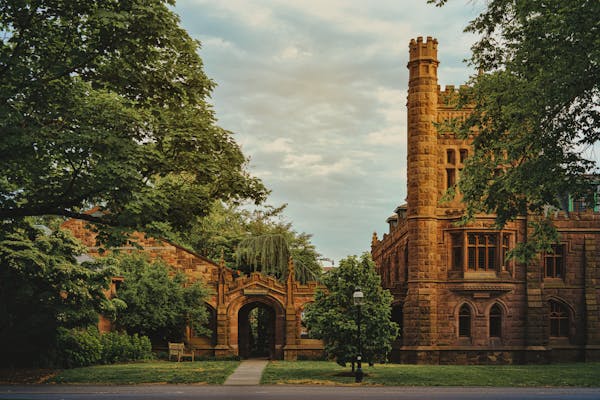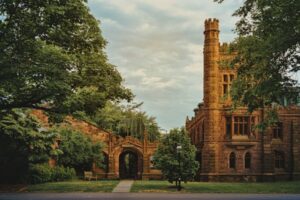Introduction to Princeton University
Princeton University, founded in 1746, is one of the oldest and most prestigious universities in the United States. Located in Princeton, New Jersey, it is renowned for its rigorous academic programs, distinguished faculty, and historic campus. As a member of the Ivy League, Princeton consistently ranks among the top universities globally, known for its commitment to undergraduate teaching and groundbreaking research.
Historical Background
Princeton University was originally established as the College of New Jersey and was the fourth institution of higher education in the American colonies. It was renamed Princeton University in 1896, reflecting its broadening scope and vision. Throughout its history, Princeton has been at the forefront of educational innovation, producing influential leaders, scholars, and public figures.
Campus and Facilities
Iconic Campus and Architecture
Princeton’s campus, spanning 500 acres, is celebrated for its stunning Gothic and Colonial Revival architecture. Landmarks such as Nassau Hall, the oldest building on campus, and the Princeton University Chapel exemplify the university’s rich architectural heritage. The campus’s meticulously landscaped grounds and historic buildings create an inspiring environment for academic and personal growth.
Libraries and Research Centers
The Firestone Library, one of the largest university libraries in the world, houses an extensive collection of books, manuscripts, and rare materials. Princeton’s commitment to research is further evidenced by its numerous specialized libraries and research centers, such as the Princeton Neuroscience Institute and the Bendheim Center for Finance. These facilities support advanced research and provide valuable resources for students and faculty.

Residential Colleges
Princeton’s residential college system fosters a close-knit and supportive community. Each of the six residential colleges offers unique programs, events, and resources designed to enhance the undergraduate experience. The residential colleges promote a sense of belonging and provide a nurturing environment where students can thrive academically and socially.
Academic Programs and Research
Undergraduate and Graduate Programs
Princeton offers a diverse range of undergraduate and graduate programs across various disciplines, including humanities, social sciences, natural sciences, and engineering. The university’s emphasis on liberal arts education ensures that students receive a well-rounded education, developing critical thinking and problem-solving skills.
Interdisciplinary Research Initiatives
Princeton is renowned for its interdisciplinary research initiatives that address complex global challenges. The Andlinger Center for Energy and the Environment and the Princeton Institute for International and Regional Studies exemplify the university’s commitment to collaborative research. These centers bring together experts from various fields to develop innovative solutions for pressing issues such as climate change, energy sustainability, and international relations.
Notable Faculty and Alumni
Princeton’s faculty includes distinguished scholars and researchers who are leaders in their fields. The university has produced numerous Nobel laureates, MacArthur Fellows, and Pulitzer Prize winners. Notable alumni include U.S. Presidents Woodrow Wilson and James Madison, Amazon founder Jeff Bezos, and Supreme Court Justice Sonia Sotomayor. The achievements of Princeton’s faculty and alumni highlight the university’s enduring impact on society.
Innovation and Entrepreneurship
Entrepreneurial Ecosystem
Princeton fosters a vibrant entrepreneurial ecosystem that encourages innovation and the commercialization of research. The Princeton Entrepreneurship Council (PEC) provides resources, mentorship, and networking opportunities for aspiring entrepreneurs. Through initiatives such as the Tiger Challenge and Startup Immersion Program, PEC supports the development of innovative ventures and helps students and faculty turn their ideas into successful businesses.
Technology Transfer and Partnerships
The Office of Technology Licensing (OTL) at Princeton plays a crucial role in facilitating the transfer of university innovations to the marketplace. OTL works with researchers to protect intellectual property and establish partnerships with industry leaders. This collaborative approach accelerates the development and commercialization of cutting-edge technologies, contributing to economic growth and technological advancement.
Global Impact and Collaborations
International Programs and Partnerships
Princeton’s global reach is evident through its numerous international programs and partnerships. The university collaborates with leading institutions worldwide, fostering academic exchanges and joint research projects. Programs such as the Princeton in Africa, Princeton in Asia, and Princeton in Latin America provide students with opportunities to engage in meaningful work and research abroad, enhancing their global perspective.

Addressing Global Challenges
Princeton researchers are dedicated to addressing some of the world’s most pressing challenges. The university’s initiatives in areas such as sustainable energy, public health, and global security demonstrate its commitment to impactful research. Princeton’s contributions to these critical fields underscore its role as a leader in advancing knowledge and driving positive change.
Student Life and Culture
Diverse and Inclusive Community
Princeton University is committed to fostering a diverse and inclusive community. The university actively recruits talented students from diverse backgrounds and provides a range of support services to ensure their success. Princeton’s commitment to diversity enriches the academic experience and prepares students to thrive in a global society.
Clubs and Organizations
Student life at Princeton is vibrant, with over 300 student organizations catering to a wide range of interests. From academic and professional groups to cultural and recreational clubs, there are ample opportunities for students to get involved and pursue their passions. These extracurricular activities complement the rigorous academic environment, promoting personal growth and community engagement.
Athletics and Recreation
Princeton’s athletic programs are an integral part of campus life. The university’s varsity teams, known as the Tigers, compete in the Ivy League and have a strong tradition of excellence. In addition to varsity sports, Princeton offers a variety of intramural and club sports, as well as fitness and wellness programs. These activities promote a healthy and balanced lifestyle, contributing to students’ overall well-being.
Conclusion
Princeton University stands as a beacon of leadership, innovation, and global impact. Its commitment to academic excellence, interdisciplinary research, and fostering a diverse and inclusive community makes it a leader in higher education. As Princeton continues to push the boundaries of knowledge and address global challenges, it remains dedicated to shaping the future and making a positive impact on the world.





